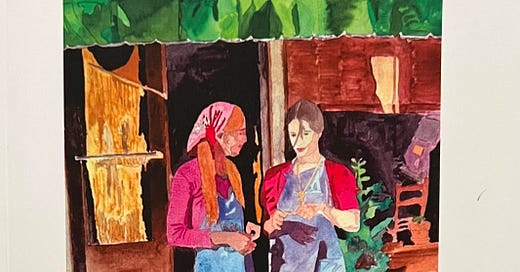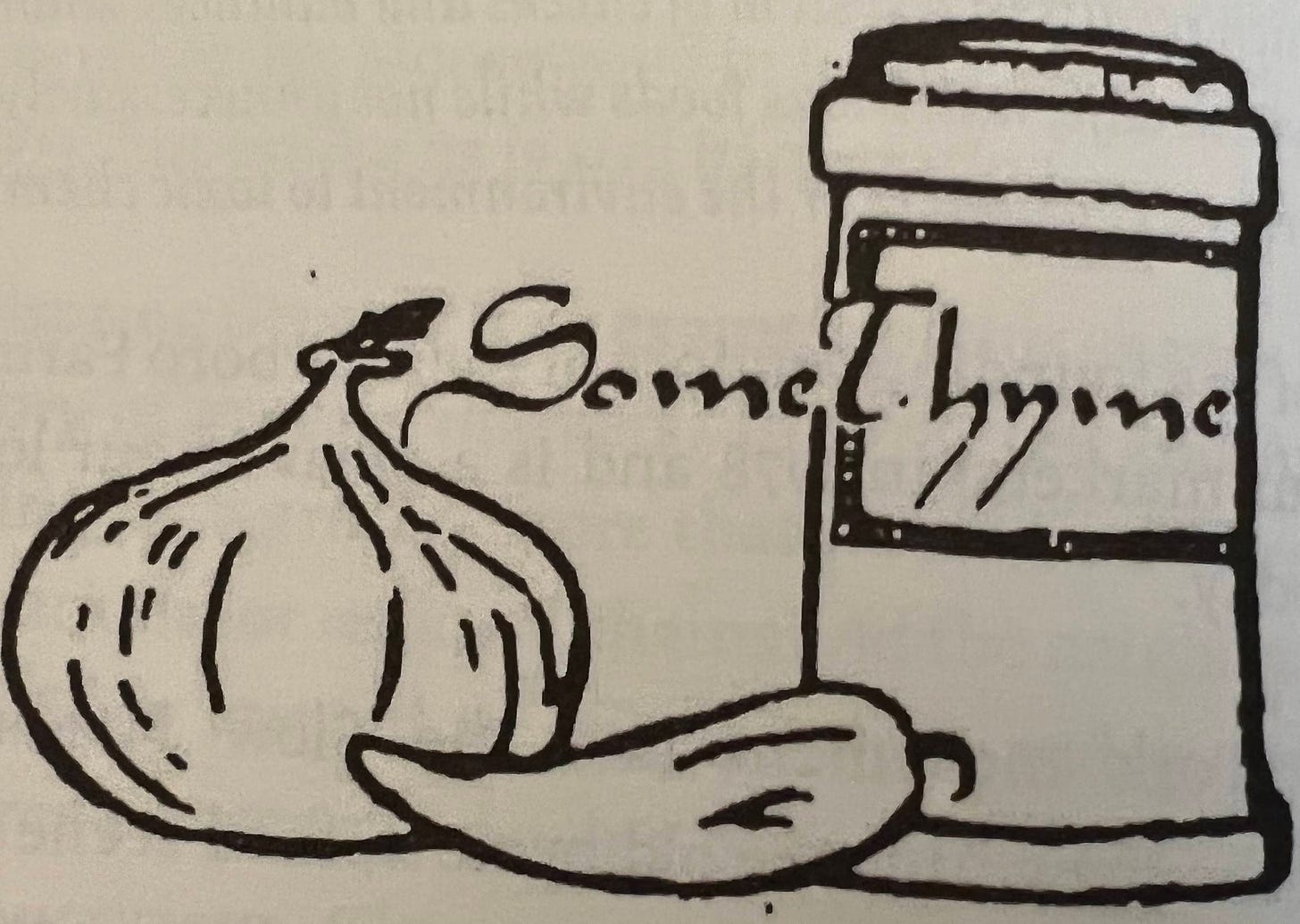I ordered a grilled pimiento cheese sandwich and a bowl of brilliant red tomato soup for lunch that day. It was the early spring of 1973. At 19, I had never eaten grilled pimiento cheese. It was a revelation. It was my first meal in a modest new restaurant in Durham, North Carolina, housed at 1104 Broad Street. That address now happens to be the title of a very personal, eminently readable, and multifaceted memoir by Mary Rocap, a songwriter, quilter, baker, and former restaurateur who now lives in Cedar Grove, north of Hillsborough.
The grilled pimiento cheese sandwich was served at what was then called The Bluebird Café, run by Nona McKee, a tiny woman with great-looking glasses. As a Duke freshman, already tired of the campus dining hall, I was excited by this new food option. I vowed to return.
Unfortunately, Nona closed the Bluebird a few weeks later, but the space reopened in the fall semester as “Somethyme Restaurant, the home of fine natural foods in Durham.” A decade later, I would read that line from a cue card into the microphone every Sunday afternoon in the studios of the radio station WDBS, a couple blocks down the street from the restaurant. Somethyme was a regular sponsor of my three-hour show, and I was a faithful customer. I stayed in Durham after college, as would so many of the restaurant’s staff and regulars, including two future Durham mayors who were Dukies of the same vintage.

Somethyme’s menu was certified hippie, a one-off in a town known then for the icky sweet scent of tobacco factories and meat-and-three diners. Somethyme’s menu was all vegetarian except for one fish dish at dinnertime. The food was ahead of its time, a pioneering venture behind the veneer of green and grey linoleum floors and the rough-hewn barnwood bar and booths. They even scored some old pews from Duke Chapel for the intimate four-tops in the back section near the kitchen. From the start, the bathrooms were gender neutral.
Somethyme’s crackerjack bakers, Mary Rocap among them, made their own bagels--a first for Durham. The house-made bread was crafted from whole wheat organic flour milled in Graham. The sandwiches featured New York cheeses. Veggie omelets could be had with not-yet-fashionable avocado and sprouts. The choice among dressings on the bountiful salads was always a dilemma. Each was a radical new taste to-die-for: Umeboshi Plum, Lemon Tahini, and a virtuous Blue Cheese (or at least it seemed virtuous since yoghurt seemed to be involved).
There was eggplant parmigiana, a satisfying beanburger never to be found elsewhere, and a dish called Heather Mountain, a hefty baked potato heaped with everything you could think of and then some. Somethyme stayed open from 11 am to midnight every day but Monday. My favorite late-night “snack” was a toasted raisin bagel with a scoop of Cherry Garcia on top. (This was not on the menu, but the staff was always accommodating.)
Over the decades, there have been formal restaurant reunions and endless reminiscences among the large Somethyme community that lingers in these parts, but Mary Rocap’s studied account has made me think more about what meal-sharing in a single public place can mean over time, what a restaurant at its best can do.
Now, nearing the half century mark since its founding, Somethyme is still alive in a multitude of deep, ongoing friendships and savory memories. Mary’s book reminds me of a more hopeful era, when our lives were mostly ahead of us. Not to mention that beer was 50 cents a glass and a hot cup of Red Zinger tea was 20 cents. The tea selection also reminds me of playing catcher for the Somethyme Red Zingers, a women’s softball team in the Durham league, a memory now lodged in my knees with every staircase I approach.
Over the twenty years that 1104 Broad Street was thriving, there were many remarkable events. In 1975 Carrboro-born folk singer Libba Cotten, the composer of “Freight Train”—in her eighties and still playing her guitar upside down— performed on the Somethyme stage. I’ll never forget the night when three of us from the Duke literary magazine staff took a quiet Canadian poet and novelist in her 30s to Somethyme for an early supper before her presentation on campus. That would be Margaret Atwood in the long hippie skirt and peasant blouse.
Somethyme was also home to local poets who gave readings on Sunday evenings. First-rate local musicians, Mary Rocap included, offered folk, blues, and rock and roll on other evenings. Sue Sneddon, an uncanny drummer and painter whom we lost this year, did her first exhibition of works at Somethyme before graduating to an always jam-packed annual opening for her colorful oils, acrylics, and pastels at Craven Allen Gallery up the street.
I also learned from Mary’s book that the restaurant’s sturdy logo was created by one of my radio mentors, Celeste Wesson, another Dukie who would become the producer of “Marketplace” on NPR for many years. My dear friend Jim Harb, who is often quoted in this blog, also worked in the Somethyme kitchen before moving on to several other high-end cooking stints, including L’auberge du Cochon Rouge in Ithaca, New York, where diners flew in on their private jets for grand meals.
As Mary suggests, “with 20 tables and a stove top with six eyes,” Somethyme launched many food careers, including cheesemakers Portia McKnight (also a powerhouse shortstop on the Zingers) and Flo Holley. They are now the proprietors of Chapel Hill Creamery. It also led to successor restaurants spawned by one of Rocap’s several co-owners, Mary Bacon, who added Anotherthyme in downtown Durham and Pyewacket in Chapel Hill with partner David Bacon. Another founder, Elmer Hall, opened a bed and breakfast in Hot Springs, NC, on the Appalachian Trail, but you had to at least know someone who knew Elmer to book a room. Martha Maiden, who drew up astrological charts for the restaurant and its various owners which are displayed in Mary’s book, would go on to study cosmology and serve NASA as a Program Executive for Earth Data Systems.
Somethyme proved that sustenance involves more than meals. The intimacy of food preparation in close quarters, the art of nourishment—spiritual and physical—the interwoven friendships and bonds of loyalty all made a profound difference in Durham and far beyond.
Restaurants like Somethyme seem rare now. But remembering how it was done helps us believe what still can be.
To order a copy of 1104 Broad Street, contact Mary Rocap directly: maryrocap@maryrocap.com







My mouth waters as I read your writing. Thank you for your excellence, in food and friendship.
I was reminiscing about my life living at 919 Board Street back in 1974-1975, and I thought of the first sandwich I ever had that had sprouts in it .. from Somethyne.... Wow... Funny how time slips away...